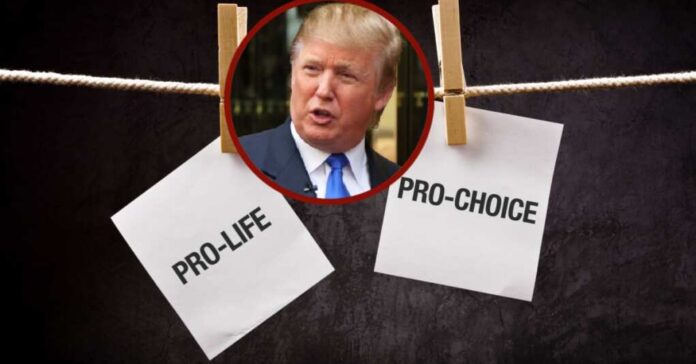
Former President Donald Trump sparked a heated national conversation about abortion laws on April 8 when he voiced his belief that states, not Congress, should decide the legality of the procedure.
In a video message on his Truth Social account, Trump emphasized the need for states to have a say in such crucial matters. “Now that we have abortion legalized, it’s time for states to decide through their votes or legislation. Whatever they decide must be respected as the law of the land,” he asserted.
Trump’s remarks drew both support and criticism from various quarters. Marjorie Dannenfelser, President of Susan B. Anthony Pro-Life America, expressed disappointment, stressing the importance of national protections for the unborn. She warned that leaving the issue solely to the states could lead to Democrats imposing extreme abortion laws nationwide, undermining states’ rights.
Former Vice President Mike Pence, a staunch pro-life advocate and Trump’s former running mate, rebuked Trump’s stance as a betrayal of pro-life supporters. He argued for minimum national protections for the unborn, calling on Republicans to boldly champion the sanctity of life.
Trump, known for his pro-life stance tempered with exceptions for cases like rape, incest, and maternal health risks, had previously hinted at finding common ground on abortion limits. He mentioned considering a federal 15-week limit, a position that some Republicans support.
Senator Lindsey Graham, a proponent of a federal abortion limit, argued that such legislation aligns with pro-life values focused on protecting the unborn. He rejected the notion that states alone should handle this issue, citing the federal government’s authority.
Trump fired back at critics like Graham, accusing them of damaging the GOP’s electoral prospects by fixating on a rigid anti-abortion stance. He argued that such positions alienate voters and pave the way for Democratic victories.
However, not all Republicans opposed Trump’s views. Senator John Cornyn sided with Trump, emphasizing the practicality and legality of letting states decide on abortion laws due to the lack of consensus for a national standard.
While not fully aligning with Trump, Kristan Hawkins, President of Students for Life Action, appreciated his focus on celebrating children and families. She also disagreed with a 15-week limit, highlighting ongoing debates within pro-life circles.
Overall, Trump’s call for states’ autonomy in abortion laws has reignited discussions within the Republican Party about the best approach to protecting the unborn while navigating complex legal and ethical considerations.
Now, let’s break down what’s happening here. Trump’s stance on abortion is stirring up strong reactions within the Republican Party and the pro-life movement. Some, like Marjorie Dannenfelser and Mike Pence, feel that leaving abortion laws solely to the states could jeopardize national protections for the unborn and play into the hands of Democrats pushing for extreme pro-abortion laws.
On the other hand, figures like Senator Lindsey Graham and Students for Life Action President Kristan Hawkins see value in a federal approach to limit abortions. They argue that protecting the unborn should transcend state boundaries and be enshrined in national law.
Trump’s stance on abortion can be both a blessing and a curse for the Republican Party, depending on how it’s navigated. On one hand, his emphasis on states’ rights resonates with many conservatives who prioritize limited federal government interference. This stance aligns with traditional Republican values of decentralization and individual freedoms.
However, Trump’s approach can also be a double-edged sword. By pushing for a state-centric approach to abortion, he risks alienating moderate voters and highlighting divisions within the GOP. This could be particularly problematic in swing states where a broad coalition is needed to secure electoral victories.
Moreover, Trump’s nuanced position on abortion, with exceptions for cases like rape and incest, may not align with the more uncompromising views of some pro-life advocates. This could lead to tensions within the party and weaken its cohesion on a critical issue.
It’s a tug-of-war between states’ rights and national consistency, with profound implications for the future of abortion policy in America.














